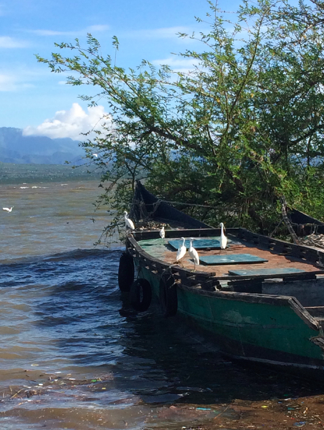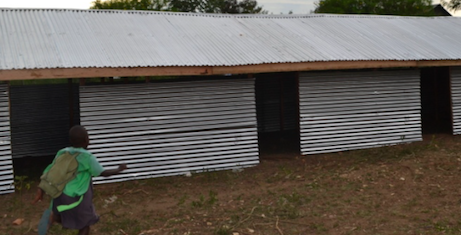the place with three doors
On the ferry ride from the mainland to the island, Francis, the social worker who runs the school for orphans on Rusinga Island in western Kenya, told me more about his story. Rusinga Island is on Lake Victoria, which is the largest lake in Africa, measuring 28,000 square miles. It has 3,000 miles of shoreline, shared by Ugananda, Kenya and Tanzania. Because of the the size of the lake and the extent of the shoreline, the main occupation here is fishing.
When we got to the waterfront where we were to catch the ferry, I saw all these wooden fishing boats bobbing gently in the water, and it reminded me of the Sea of Galilee in Israel where I visited last summer — the place where Jesus found Peter and Andrew and told them to leave their nets and come be fishers of men.
Once we were on the ferry, Francis told me the story of the orphanage and school he started.

In 2009, he was working in the fishing industry on the shore when he saw two dozen young children hanging out on the beach, and wondered why they weren’t in school, but didn’t think much of it. Until the following week, when he was at a different fishing village, and saw the same thing — school-aged children hanging out at the lake when they should have been in school.
The next time he was in his hometown, he went to the children on the beach and asked WHY they weren’t in school. One said his parents had died of AIDS, and now he couldn’t afford to pay the school fees that schools in Kenya require. The next boy said his father had died of AIDS, and his mother could pay his school fee but couldn’t afford to buy him the required uniform. The next child said she had several infant or toddler aged siblings, and they lived with their grandma because their parents had died of AIDS. Her grandma kept her home from school to help with childcare and housework.
As he went around the circle, the answers were different, but had the same root: children who had lost parents to AIDS and were left without the necessary resources to attend school.
Francis said something in his spirit stirred, and he felt very clearly that he was supposed to teach them. He had a background in social work but had no experience in education….and yet….
He asked the students to meet him in an abandoned building the following Monday morning. He was sure that they wouldn’t come, but he showed up just in case. Nearly 30 children were there waiting for him, eager to learn and even more eager for the food he’d promised to give them for breakfast if they came.
The room was not set up as a classroom. There were no desks or chairs, no chalkboard or eraser, no books or paper or writing utensils.
So, with one book and one pencil he’d brought with them, Francis began to teach.

The next day, he was sure the children wouldn’t return because who would go to school without being required to — especially when they could spend the day at the lake? He was so sure they wouldn’t come that he didn’t show up either.
His father-in-law, who lived near the abandoned building, called him at 9 a.m. “Francis, there are so many children here,” he said. “And they tell me they’re all waiting for you?”
Francis quickly made his way there….and every morning after that. He went around the town asking people to contribute whatever change they could afford, and went and bought the students paper and pencils. He and his wife, who themselves were struggling financially, spent their own money to buy enough food to feed the children breakfast every morning. If he and his wife were able to find extra work, sometimes they had enough to feed the children lunch.
“Otherwise, they ate nothing,” Francis said. “They sleep outside or go to a distant relative’s house, and there is no food. There is nothing to eat.”
The school kept going, and he felt strongly that this was his calling. So he approached the owner of the abandoned building, which he calls “the place with three doors” because there are 3 main doors that lead inside. He said, “I don’t know how I’m going to pay for it, but I’m going to rent this building from you.” And he did. And, though sometimes the money came at the very last minute, he always had enough money to pay rent.
He and his family cleaned up the building as best they could, and had an official “move-in” day with the 50 children who were now regularly attending the school.
They christened the school, “Alekii” which is Swahili for “I have a dream.”
***